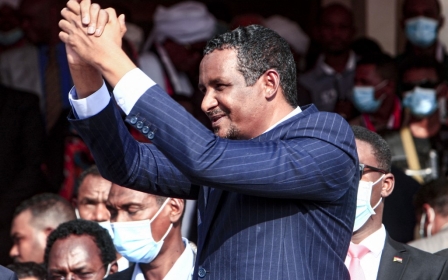Sudan: Travel ban imposed on 11 civilian members of transitional government

Sudan's security service has restricted travel for 11 civilians tied with government bodies, most of whom are part of a task force that has been overseeing the country’s transition to democracy, according to senior civilian government sources.
The move comes amid high tensions between the military and civilian leaders sharing power in the transitional government following a failed coup in September.
Stay informed with MEE's newsletters
Sign up to get the latest alerts, insights and analysis, starting with Turkey Unpacked
Last month, Prime Minister Abdalla Hamdok accused rogue supporters of former president Omar Hassan al-Bashir of trying to derail the revolution that toppled the long-time autocrat in 2019.
Most of the officials targeted by the ban are on the task force responsible for dismantling Bashir’s financial and political legacy, officially known as the Committee to Dismantle the June 30, 1989 Regime and Retrieve Public Funds.
One of the travel ban’s targets is Mohamed al-Faki, a member of the ruling transitional Sovereign Council, who last month accused the military of taking advantage of the coup in order to seize power. Salah Manaa, a businessman also targeted by the travel ban, managed to board a flight and flee to Cairo, Reuters reported on Wednesday.
Accusations fly
Following the September coup attempt, the Sudanese army has stopped providing security to members of the task force committee, and asked for changes in the civilian coalition with which it leads the country.
Speaking to Reuters, a senior military official denied allegations that the military was involved in orchestrating the travel ban, adding that these measures do not fall within its mandate.
Sources speaking to Reuters accused Sudan’s General Intelligence Service (GIS) of being behind the travel ban, which critics have called illegal, noting that the responsibility for these measures lies with the public prosecutor’s office and not with the security service.
The cabinet, which answers to the Sovereign Council, is pressing for an investigation.
There was no immediate comment from the GIS.
The travel ban comes after nationwide protests in Khartoum, Madani, Atbara and other cities calling for an end to the military's participation in the transitional government.
Last week, trains from Atbara and Madani also carried hundreds of protesters to the demonstration in Khartoum, where those attending raised anti-military banners and chanted slogans condemning the attempted coup.
International response
As tensions rose last week, a number of international envoys rushed to visit Sudan in order to ease the strain between the military and civilian leadership.
A United Nations source disclosed that Volker Perthes, special representative of the UN secretary general for Sudan, has been in Khartoum to undertake a series of meetings with civil and military officials in the transitional government.
“We got clear promises from the military that they would protect the transition and commit themselves to the constitutional declaration, while the civilians also promised to improve their performance,” the source, who asked for anonymity because he is not authorised to talk to the media, told Middle East Eye earlier this month.
Last week, the US special envoy for the Horn of Africa, Jeffrey Feltman, also visited Khartoum, along with the special envoys of the UK, France and Norway.
Sudanese political analyst Salah Aldoma attributed the current increased tensions in the country to the uneasy balance of power between the military and civilian leadership, especially as the transition enters its second half.
“The deep state of Bashir’s associates is hidden among the military and still has a presence inside the army," Aldoma told MEE. "So the West has to put more pressure on the army in order to push for clear reform of the military and security sectors in the country. But we have to say that the first frontliners in protecting the democratic transformation are the people of Sudan.”
Demand for military reform
A recent crackdown on what security services have called “terrorist attacks” and “terrorist cells” in Khartoum have prompted calls to bring the intelligence apparatus under civilian control.
The civilian component of the Sovereign Council, the Forces of Freedom and Change (FFC) alliance, issued a statement this week demanding reforms in the military as a means of dealing with the current unrest.
“The terrorist attacks come in conjunction with political destabilisation in the country and the threat of a military coup last month, amid wide tribal clashes in different parts of the country and closure of the ports by protesters in Eastern Sudan, which has caused interruptions in the supply of basic commodities to the rest of the country,” the FFC statement read.
“This proves that the demand of security and military reform is a key point for the stability of the country.”
Middle East Eye delivers independent and unrivalled coverage and analysis of the Middle East, North Africa and beyond. To learn more about republishing this content and the associated fees, please fill out this form. More about MEE can be found here.







